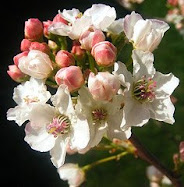 Come the autumn, garden writers often put forth columns of advice on “putting the garden to bed” for the approaching dormant winter season, sometimes giving the impression this is a task that can be done in one fell swoop. In fact, the bedding down of existing plantings, sowing of bulbs for the next spring, clearing and cleaning up which comprise autumn's garden tasks happen progressively, over a period of months, as the diverse trees, shrubs and plants each reach their own varied apexes, and become ready for the long winter sleep.
Come the autumn, garden writers often put forth columns of advice on “putting the garden to bed” for the approaching dormant winter season, sometimes giving the impression this is a task that can be done in one fell swoop. In fact, the bedding down of existing plantings, sowing of bulbs for the next spring, clearing and cleaning up which comprise autumn's garden tasks happen progressively, over a period of months, as the diverse trees, shrubs and plants each reach their own varied apexes, and become ready for the long winter sleep.At mid-October, when garden magazines might be promoting the cutting down and discarding of perennials, a big, healthy sweep of cosmos were finally just bursting into bloom in my garden. The coreopsis sweet dreams and limerick dreams were both displaying a second, happy round of sienna and apricot-colored flowers, the chrysanthemums had at last attained the flowering stage. Even some of the lavender plants were offering up a second, smaller spray of blooms to be collected and dried into fragrant bundles to decorate a pitcher or vase all winter long.
Raking leaves is never necessary in my garden, thanks to the winds off Lake Michigan which careen through the big, open-field layout of this neighborhood in a notch between high dune bluffs. All debris and leaves which hit the ground promptly get blown away, tumbling down the streets and across yards until they hit the wild fields of the rising hills to the east. If raking were needed, however, it would have to be done repeatedly over many weeks, as the trees also shed their summer growth at disparate, individual rates. The apple trees drop their leaves first in this garden, then the maple, then the cherry, then the aspen, none of them all at once but rather bit by bit. The birch, red oak and pear hold on longest, and lovely it is to have their yallery-russet foliage to gaze upon in November and even December, when otherwise there are but brown and grey empty branches across the hillsides and woods.
At the end of my street, two blocks away, a three-block long stand of northern white pine traces the western terminus of the neighborhood. Beneath these mighty, 40- to 50-foot seniors, a broad and deep carpet of freshly fallen pine needles can be found each autumn. This is the source for an endless supply of free, local, native, excellent mulch for the trees, shrubs and perennials in the garden, as they become ready for blanketing against the freezes and thaws of the coming months. Many a trip is made to the end of the block with the empty wheelbarrow, returning heaped with sweet-scented pine needles, interspersed with a sprinkling of attractive pine cones which will be scattered randomly around the yard to add visual interest. How satisfying it is to tuck handfuls of the pine needles all round and about the chrysanthemums and other flowers, the hydrangeas, forsythia and virburnums, as well as the tree trunks. Like tucking in a child with a thick, warm comforter on a chilly night, the fall mulching with pine needle blankets makes one feel like a good, caring and wise plant nanny, securing the garden family against the cold.
This fall, the intention was to order lots more drumstick and stars of Persia alliums, daffodils, tulips, narcissus, hyacinths, wind flowers and so on, a big, fresh bounty of bulbs to supplement those already in the ground and prepare for a profuse spring. Fate and the dire Michigan economy intervened, however, and the gardener received, in early October, an unanticipated, no-notice-given layoff from gainful employment. Because this meant the only income in the foreseeable future would be bare-bones unemployment benefit, until new employment could be secured in a very bleak market, orders for bulbs had to be forfeited along with all other unnecessary expenditure.
In such circumstances, one tries to remain hopeful and optimistic, to face forward and expect and pursue better opportunity, the old “when one door closes, another opens” attitude. The walking papers came, though, from a job that had been held and glowingly reviewed for some two years, with no raises during the job tenure but promises of a big, year-end bonus due to come just a couple months from now. Further, the professional office that cut the job was actually doing quite well, having quadrupled income over the course of recent months. The owners apparently decided that more of this income could safely be deposited in their own pockets if the position of a decently remunerated staff member was replaced with a novice who could be paid substantially less, and the payment of one year-end bonus rendered moot.
It's challenging not to succumb to bitterness, anger, continual backward gazing, and cursing of the owner-class in such circumstances. It's difficult to comprehend why an employer would not give a productive, successful employee the benefit of advance notice of termination, and every possible opportunity to replace the disappearing paycheck with new employment, before they are shown the door and an indeterminate period of angst and penury. It's not hard to understand why the owner-manager class wishes to keep all the money and all the say-so, to quote W.E.B. DuBois, but the managerial class behaves stupidly and contrary to its own best interest when it treats those who produce for them in such a shabby, dishonest, ill-will generating fashion.
Walking on a balmy autumn afternoon along the lake shore, trying to just hear the whisper of the waves and contemplate the pearly blue horizon, trying not to panic or fall prey to debilitating emotions of self pity and fear, the gardener happened upon another hiker, a lady of a certain age and fellow village resident. She is an exceptionally kind and gentle lady, who started her own craft enterprise of making Peace Bears. This entails claiming discarded and unwanted stuffed animals from yard sales, friends and thrift shops, cleaning and repairing them, embroidering a peace symbol on their chests, and then selling them for a small fee at the farmer's market. After saying hello, the lady explained that she wasn't at her usual weekday post of reception in a local dental clinic because she, too, had been permanently laid off, after the solo-practice dentist suddenly decided to retire. Her job tenure numbered 18 years of service. Her advance notice of termination was 11 days. She was self-effacing and mild-mannered about her stark situation, and the painful conundrum of trying to make mortgage, utility, car note, grocery and other bill payments on a subsistence unemployment benefit.
Maybe these days you have to make your own employment, she hazarded, find ways to generate income working entreprenurially, independent of others, keeping your destiny in your own hands. She went on to tell me about a line of health and beauty products she's trying to sell as a franchisee, and discussed how she wants to take this period of unemployment to work on and develop her artisanal crafts.
Strolling on down the beach, the gardener stopped casting glances backward over her shoulder, stopped revisiting and worrying at and rewriting the endgame and termination meeting at the old job. The late-autumn Indian summer weather means the soil is pliable and ripe for receiving bulbs. The local garden center, because November is upon us, has cut bulb prices in half. With a bit of make-do and thrift, it was doable that at least a swath of snowdrops, perhaps two new congeries of daffodils, and mayhaps another half-dozen alliums could, in fact, be purchased. Gardeners by nature must be hopeful creatures, able to envision the yield in the future for the labor and investment of the present. A garden is nothing if not a work of optimism and sunny expectation. When autumn, or the slings and arrows of bad fortune, bring foreshadowing of diminution and decline, the wise gardener rolls up her sleeves, sticks her hands into breathing earth, encourages the plenty the future will bring, given a bit of elbow grease, and looks steadily forward.









No comments:
Post a Comment